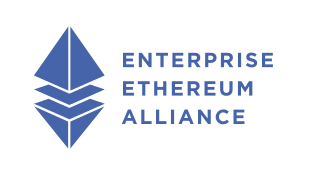Enterprise Ethereum Alliance Releases Trusted Compute Application Programming Interfaces to Help Enterprises Get Blockchain Applications to Market
October 29, 2018
The APIs Offer a Standard Programming Model for Using Trusted Compute to Improve the Privacy, Security, and Performance of Enterprise Ethereum Use Cases.
PRAGUE – Oct. 29, 2018 –The Enterprise Ethereum Alliance (EEA) today announced the public download at its website of the EEA Off-Chain Trusted Compute Specification V0.5 document. Many enterprise blockchain use cases have demanding requirements for privacy, security, and performance that are difficult to achieve. Temporarily moving some transactions off the main blockchain (“off-chain”) for computation elsewhere, and then returning a summary to the main blockchain (“main chain”) is a promising method for achieving such requirements. While off-chain programming can be done from scratch for each use case, today’s EEA Off-Chain Trusted Compute Specification offers programmers a set of standard application programming interfaces (APIs) that make it easier to properly write such programs and to inspect, share and re-use them. EEA members can download the specification here.
For trusted compute to work, the results and recording of any of the off-chain computations must be trustworthy. Various methods of achieving such trust have been proposed, and the EEA Off-Chain Trusted Compute Specification APIs are intended to be method independent. Programmers should be able to try different trusted compute methods and discover which works best for their use case. With this Specification release, the APIs have been reviewed for compatibility with the following trusted compute methods:
- Trusted Execution Environments (TEEs)
- Zero-Knowledge Proofs
- Trusted Multi-Party-Compute (MPC)
“The EEA’s Off-Chain Trusted Compute Specification supports the Enterprise’s needs for privacy, security, and performance on the blockchain,” said EEA Executive Director Ron Resnick. “What’s more, enterprises can choose whichever trusted compute methods work best for their use case, whether it is for supply chains, banks, retail, or other large enterprise-based ecosystems. On behalf of the EEA, I’d like to thank the Trusted Execution Task Force of their extensive contributions to this Specification.”
The Off-Chain Trusted Compute Specification V0.5 has been designed to support the following enterprise needs:
- Private transactions on a blockchain between mutually-untrusting parties without disclosing transaction details to other parties who also have access to the blockchain
- Disclosure of partial information to chosen parties on a blockchain, while maintaining the confidentiality of other information from those same chosen parties
- Offloading selected transactions from the main blockchain to a trusted compute environment to improve performance
- Attested oracles to provide trusted external information needed for some enterprise use cases
“Trusted compute is a fundamental technology to take enterprise blockchain use to the next level, and the Specification’s Trusted Compute APIs make it easier. This is a good day for the blockchain industry,” said Tom Willis, EEA Founding Board Member, and a Director at Intel’s Open Source Technology Center. “We invite Enterprise leaders around the world to join the EEA and participate in this important work.”
Join the EEA at DevCon4
As an Olympic Sponsor at the Ethereum Foundation’s flagship developer conference, Devcon4, Oct. 30 – Nov. 2, 2018, at the Prague Congress Center, the EEA will lead a notable round of Devcon activities including presentations and interactive booth discussions on the new Specifications, coming innovations, certification program, and real-world use cases. Following Devcon, attendees are invited to an EEA-sponsored Meet-Up to meet with EEA Executive Director Ron Resnick and EEA Technical Standards Working Group Chair Conor Svensson, founder, and CEO of blk.io, to discuss EEA’s vision and roadmap.
EEA Momentum and Roadmap
With over 500 organizations as members, the EEA anticipate continuous momentum as members work with the global development community to build, test and certify solutions to grow the ecosystem. The EEA will introduce a TestNet to further assure interoperability across member solutions. In addition, the EEA will oversee a members-only Certification Program that ensures solutions conform and interoperate with the standard, building confidence in an offering’s performance.
About the EEA
The EEA is a member-led industry organization based on the goal of empowering the use of Ethereum blockchain technology as an open standard for the betterment of all industries, focused on the needs of enterprises. For additional information about joining the EEA, please reach out to [email protected].

